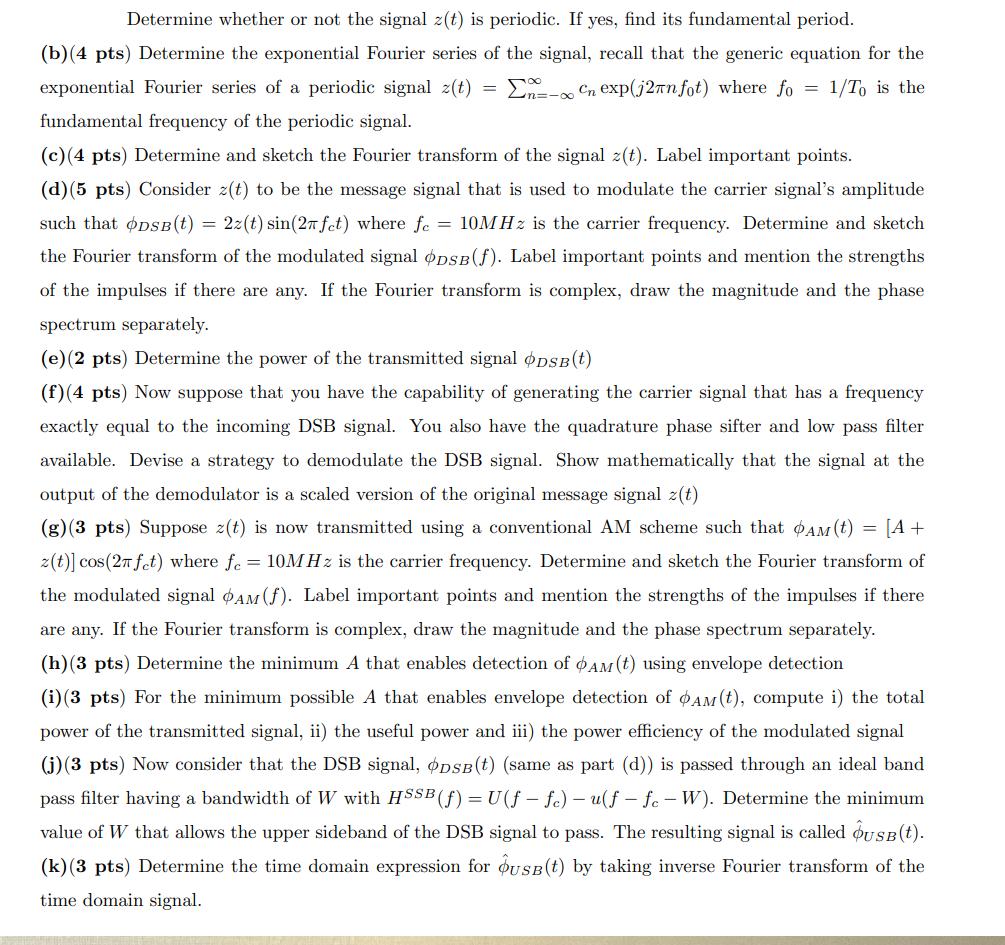Answered step by step
Verified Expert Solution
Question
1 Approved Answer
Determine whether or not the signal z(t) is periodic. If yes, find its fundamental period. (b) (4 pts) Determine the exponential Fourier series of

Determine whether or not the signal z(t) is periodic. If yes, find its fundamental period. (b) (4 pts) Determine the exponential Fourier series of the signal, recall that the generic equation for the exponential Fourier series of a periodic signal z(t) = -- Cn exp(j2an fot) where fo = 1/To is the fundamental frequency of the periodic signal. (c)(4 pts) Determine and sketch the Fourier transform of the signal z(t). Label important points. (d) (5 pts) Consider z(t) to be the message signal that is used to modulate the carrier signal's amplitude such that ODSB (t) = 2z(t) sin(2 fet) where fc = 10MHz is the carrier frequency. Determine and sketch the Fourier transform of the modulated signal DSB(f). Label important points and mention the strengths of the impulses if there are any. If the Fourier transform is complex, draw the magnitude and the phase spectrum separately. (e) (2 pts) Determine the power of the transmitted signal DSB (t) (f)(4 pts) Now suppose that you have the capability of generating the carrier signal that has a frequency exactly equal to the incoming DSB signal. You also have the quadrature phase sifter and low pass filter available. Devise a strate to demodulate the DSB signal. Show mathematically that the signal at the output of the demodulator is a scaled version of the original message signal z(t) (g) (3 pts) Suppose z(t) is now transmitted using a conventional AM scheme such that AM (t) [A + z(t)] cos(27 fet) where fe = 10MHz is the carrier frequency. Determine and sketch the Fourier transform of the modulated signal AM (f). Label important points and mention the strengths of the impulses if there are any. If the Fourier transform is complex, draw the magnitude and the phase spectrum separately. (h)(3 pts) Determine the minimum A that enables detection of CAM (t) using envelope detection (i) (3 pts) For the minimum possible A that enables envelope detection of AM (t), compute i) the total power of the transmitted signal, ii) the useful power and iii) the power efficiency of the modulated signal (j) (3 pts) Now consider that the DSB signal, DSB (t) (same as part (d)) is passed through an ideal band pass filter having a bandwidth of W with HSSB (f) = U(f-fc) -u(f- fe - W). Determine the minimum value of W that allows the upper sideband of the DSB signal to pass. The resulting signal is called USB (t). (k) (3 pts) Determine the time domain expression for USB (t) by taking inverse Fourier transform of the time domain signal. = z(t) = cos (10,000t) sin (20,000t)
Step by Step Solution
★★★★★
3.39 Rating (152 Votes )
There are 3 Steps involved in it
Step: 1
To solve this equation we can use the trigonometric identity that cos sin cos2 Therefore we can rewr...
Get Instant Access to Expert-Tailored Solutions
See step-by-step solutions with expert insights and AI powered tools for academic success
Step: 2

Step: 3

Ace Your Homework with AI
Get the answers you need in no time with our AI-driven, step-by-step assistance
Get Started


